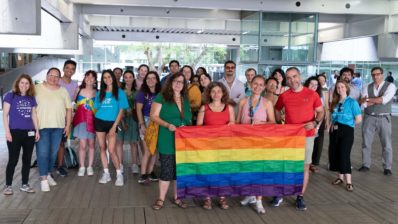In celebration of the International Day of LGBTIQA+ People in STEM, an event opened to the whole community at the Barcelona Biomedical Research Park (PRBB) took place on November 9th.
The 90-min workshop, entitled “Breaking Barriers: Empowering Women, Minorities and LGBTIQA+ in Science” aimed at reflecting together and co-creating messages to work against discriminatory situations in science.
About 25 people came to the event. Most of them (62%) were research support staff and technicians, while 24% were junior and mid-career researchers. The rest (14%) were admin staff. Participants were mostly women (23 out of 25), and mostly of European descent, although there was some cultural diversity.
The event started with a 20 min introductory talk on diversity in science, by Simon Perera (researcher at IBE and member of PRISMA and the LGBTIQA+ group at the PRBB). This focused primarily on gender, identity and sexual diversity, but many issues were applicable to other diversities.
After this, participants were asked to share, in small groups, real situations where they had suffered or seen discrimination in a scientific environment. They were also asked to think of potential responses to those situations, which were later shared with the whole group.
Day-to-day discrimination
When we hear the word discrimination we may think of dire behaviours, unacceptable but not very common. But there are lots of situations that are discriminatory and occur on a daily basis – especially to some collectives.
Some of the common discriminatory situations discussed in the event included examples of:
Gender discrimination, e.g.
- Women being routinely asked to do admin tasks, such as taking notes in a meeting.
- Physical looks – such as how you dress while presenting a seminar – being more judged on women than on men.
- Use of sexist expressions like “man up!” to mean be strong and show courage, or “men cannot multitask”, which may provide a justification for men to hand over some of the work to women.
- Mansplaining: one person (in this case, a female) is more expert than another, but the man thinks he is the expert and explains the issues in a patronising way.
- Pejorative comments towards menstruating people, like “oh one of these days of the month, right?”
Sexual identity/Orientation, e.g.
- The cultural assumption that everyone has cis hetero partners, which could easily be avoided by using a neutral, more inclusive word like “partner” instead of boyfriend/girlfriend.
- Being questioned relentlessly about your sexuality or about your sexual identity, or people questioning your sexuality behind your back.
Race, e.g.
- Perpetration of racial stereotypes that have a negative impact: e.g. you are from Mexico, therefore you are probably involved in dirty businesses.
- Colleagues touching a black person’s hair without permission.
- Being followed around by security at your workplace only because of your race.
- People perceiving someone as less intelligent due to their race.
- Lack of inclusion: an example was voiced where, in a meeting about diversity aimed at international students, racial diversity was not included, which made a big part of the audience feel invisible.
Other situations could be applied to several diversities:
- Assuming that women or people of colour or people with disabilities are included just to meet ratio issues, rather than by their own merit.
- Being the only woman (or another “minority”) in a group of white men, and getting cut off, not being paid attention to, or being contradicted more than your peers.
What can be done?
Something that became clear was that there are situations in which we stereotype people perhaps due to a lack of education or knowledge, and this can lead to racism, or discrimination. It is important to let the person that is using this racist/discriminatory language know, so they can improve.
Sometimes, people may use discriminatory language without being aware of it being discriminatory. Whose job is it to educate them?
But there was a lot of discussion regarding whose job it is to ‘educate’ these people. Should the person being discriminated against do it? Sometimes this works and may be enough. In one example, a latino woman mentioned receiving a pejorative comment in a professional environment. Despite feeling really uncomfortable, she managed to find the strength to talk to this person and explain why what they had said was wrong. The other person realised and quickly apologised.
But it should not always be your job; you don’t really owe anyone an explanation, unless you want to do it. And in some cases, it may not be possible, or advisable to do so – if you are a newcomer or a junior member in a team, or if the other person is not someone open to discussion, and vehemently negates discrimination.
In these situations, it is important to have ‘allies’: people who are from the ‘majority’ group, and therefore not likely to be discriminated against, who can actively help with this by speaking out. However, even for an ally it can sometimes be difficult to confront someone who is having a discriminatory behaviour, for example due to power relations. In that case they can also try to ‘divert’ the situation; remove the discriminated person from the situation to safeguard them, without directly confronting the perpetrator at that time.
Allyship is probably the safest and strongest way of fighting discrimination.
Therefore, to avoid or respond to most of these situations different levels are needed:
- Pre-empting/Avoidance: Having mechanisms in place to avoid it in the first place: e.g. the person in charge of a meeting can remind participants of a code of conduct, or set up a rotation system for contributions, notetaking, etc. We can use inclusive and respectful language. We can work to actively avoid generalisations and assumptions.
- Assertiveness: Defending yourself / telling the other person why what they are saying is discriminatory. Although this often can result in being seen as “bossy” or having a “strong personality” and puts all the responsibility in the person affected.
- Allyship: having a person from the ‘majority’ group intervene in support of the ‘minority’ person probably sends the strongest message in the safest way.
In any case, these discriminatory situations need to be escalated towards the leadership of the centres, so they are given visibility, and we all together help foster institutional and cultural change.
Moving forward
The event was very well received. Participants agreed that more time was needed to further discuss these issues, and asked for other similar events, talks about different diversity collectives or compulsory training on inclusive language or unconscious bias at the institutional level – to ensure reaching everyone, including those less aware or conscious.
Because all the situations discussed in the meeting have something in common; they make those affected feel very uncomfortable and unwelcomed. And nobody should feel like that at their workplace. It’s up to all of us to actively avoid these situations and step up to respond when they occur, so we can create a diverse and inclusive environment for everyone.
————–
This activity was co-organised by the LGBTIQA+@PRBB group, the CRG Gender Balance Committee and the PRBB Equality, Diversity and Inclusion Committee.
The event was part of a wider campaign that the PRBB Equality, Diversity and Inclusion Committee is working on about general discrimination/harassment of people working in science. This includes a ‘perceived discrimination survey’, which was launched last November 16th (International Day for Tolerance) and has collected over 250 responses, and an anti-discrimination awareness campaign that will be launched in 2024. Watch this space for more to come!







